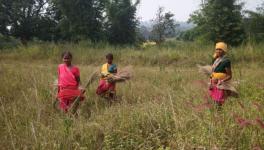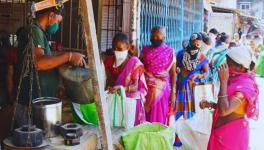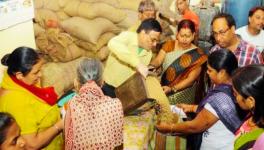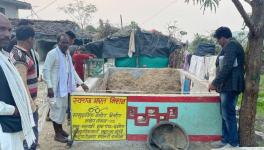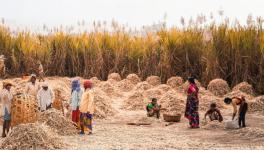COVID-19 in Rural India-XXVI: Sharp Fall in Vegetable Selling Prices Leave Jharkhand’s Tribal Farmers Reeling
This is the 26th report in a series that provides glimpses into the impact of COVID-19-related policies on life in rural India. The series, commissioned by the Society for Social and Economic Research, comprises reports by various scholars who have been conducting village studies in different parts of India. The reports have been prepared on the basis of telephonic interviews with key informants in their study villages. This report presents the impact of COVID-19 pandemic on the tribal village of Hehal located in Ranchi district of Jharkhand, where a sharp fall in selling prices and the lack of cash for the upcoming paddy cultivation has added to the distress of tribal farmers. Further, the low yield of the last season’s paddy harvest has led to most households running out of food grains.
Hehal village is a tribal majority village located in Ranchi district in Jharkand. About 97% of households in the village belonged to the Oraon caste according to a 2015 census survey of this village focusing on the socio-economic conditions of the people conducted by the Society for Social and Economic Research (SSER). Other scheduled tribes such as Lohras and Mundas also resided in the village. Most people in the village were primarily engaged in cultivating their small landholdings. Also, Hehal is located on the edges of Ranchi city, so many workers commute to Ranchi to work as manual workers in the informal sector, in non-agricultural activities like construction. There were also a few households for whom salaried government employment or pensions from such employment were an important source of income. Such households had a distinctly better economic status than other households in the village. There is no forest near Hehal. However, trees in homesteads and fields were an important source of firewood, edible leaves, and fruits.
Impact on the Agricultural Sector
Agriculture in Hehal is primarily un-irrigated and rain-fed. Paddy and finger millet are the most important crops; they are grown between June and November. There are shallow open wells in some fields. But the irrigation capacity of these wells is small, and they are mainly used by peasants to grow vegetables like beans, tomato, capsicum, pumpkin, ridge gourd, and so on during the rabi season. These vegetables are grown by the farmers partly for household consumption and partly for sale in the local mandis. None of these mandis have been functioning since the lockdown began on March 24. Hence, the farmers have not been able to sell their produce and are incurring huge losses.
Since the mandis are not opening, the respondents reported that four or five wholesale dealers from Ranchi city come at around 5.00 a.m. every alternate day to buy vegetables from farmers in the village. They remain outside the village, and are only allowed to be there for an hour or so by the policemen—they have to be back in the city by 7.00 a.m. One respondent, a small-scale peasant who grows capsicum and beans, reported that there is a rush among farmers to sell to these traders as they are the only option available. The prices offered by these traders are considerably lower than those the farmers would have received if they could sell in mandis: the price of potatoes has dropped from Rs 25 per kg to Rs 5 per kg, the price of beans from Rs 30 to Rs 6 per kg, capsicum from Rs 50 to Rs 20 per kg and tomato from Rs 25 to Rs 7 per kg. Farmers in the village are forced to accept these low prices because there is no way they can protect their crops from pests and diseases if they remain unsold, according to the respondent.
The farmers are also extremely worried about the next season's paddy cultivation. The respondent estimated that he would need a minimum of Rs 8,000 to 10,000 in cash to prepare for the paddy sowing next month. He reported that the price of paddy seeds is as high as Rs 350 per kg, an hour of ploughing in the field with a tractor costs Rs 1,200, and the purchase and application of manure and fertilisers would be an additional expense. Paddy cultivation is extremely important for the food security of the inhabitants of the village, as it is cultivated mainly for household consumption.
Impact on Workers in the Non-agricultural Sector
Daily wage workers engaged in non-agricultural work such as construction and loading/unloading are the worst affected by the lockdown. Most have been out of work for a month now, incurring a loss of about Rs 250 per day. One of the casual wage workers in the village remarked, "We do not receive timely wages even for the work we do, this time we could not even work, what will we get? No one knows how we will feed our children.”
Two respondents—a driver and a domestic worker—used to work for a monthly salary. The driver reported that his employer has agreed to give him Rs 2,000 to help sustain his family through the lockdown. The female domestic worker reported that her employer has stopped taking her calls and that she has probably lost her job. She is a single mother and has three school-going children to feed.
A respondent who teaches at an I.T.I institute in Ranchi reported that he has been working throughout the lockdown period, helping the government with administrative work. He has attended various training programs to do with the COVID-19 pandemic and has been granted a pass to commute to the city every day. He reported that he expects his salary to be credited in time, and does not anticipate facing financial problems during this period.
Social Protection Schemes during the COVID-19 Crisis
Owing to inadequate rainfall, the paddy yield last year was quite low. As a result, most households have already run out of food grains. In such times, rations distributed under the Public Distribution System have been a source of relief to the people in the village. The respondents reported that all ration card holders in the village received their grain entitlements for two months in the first week of April. However, most households did not receive any kerosene oil at this time. Also, households that did not have a ration card, or had members who were not listed on the ration card, did not receive any grain.
The widow of an ex-member of the armed forces reported that she is relieved that she receives a monthly pension of Rs 7,000, which is what she has to live on during the lockdown. She also reported that she has a heart condition but has run out of her medications. There is no doctor in the village who she can visit in order to continue her treatment.
The role of social protection schemes in providing relief to people in distress cannot be overstated. While it is important that the lockdown and social distancing are enforced in order to curb the spread of COVID-19, people in areas like this village are at great risk of being pushed into extreme poverty and hunger in the absence of strong state support.
[This report is based on telephonic interviews conducted between April 20 and 22 with nine respondents in the village: three are male peasants who cultivate small landholdings, one man works as a driver in Ranchi city, one is the widow of an ex-member of the armed forces, one woman works as a domestic worker in a landlord's house near the village, one man teaches at an I.T.I institute in Ranchi and two men are non-agricultural casual wage workers who mostly work outside the village.]
The author is a Research Scholar at the Centre for Economic Studies and Planning, Jawaharlal Nehru University, New Delhi.
Get the latest reports & analysis with people's perspective on Protests, movements & deep analytical videos, discussions of the current affairs in your Telegram app. Subscribe to NewsClick's Telegram channel & get Real-Time updates on stories, as they get published on our website.










